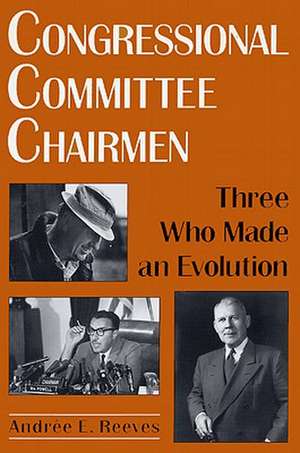Congressional Committee Chairmen: Comparative Legislative Studies
Autor Andree E. Reeves, Andra(c)E E. Reevesen Limba Engleză Hardback – 26 aug 1993
Congress does most of its work in committee, and no understanding of that body can be complete without an analysis of its committees and those who shape them. Andree Reeves now offers a rare glimpse into the workings of committee chairmanship over a span of thirty-three years-how three chairmen operated and how they influenced their committee and its impact.
As Reeves demonstrates, the chair is the most important player in a congressional committee-the one who holds more cards than his colleagues and can deal a winning hand or call a bluff. His use of institutional and personal resources affects the committee, the chamber, and public policy.
As a case study, Reeves compares the leadership of three disparate and strong House Education and Labor Committee chairmen who served from 1950 to 1984: Graham A. Barden (D-NC), Adam Clayton Powell (D-NY), and Carl D. Perkins (D-KY). She delves into each chairman's background, orientation, and use of resources. Each had his own brand of leadership, she finds, and a pronounced but different impact on Education and Labor. The committee blocked "progressive" legislation under Barden, facilitated Johnson's Great Society under Powell, and fought tooth and nail to maintain its accomplishments under Perkins.
Reeves emphasizes also committee development, including the effects of reforms, the relationship between committee composition and policy output, and committee voting patterns. Rather than advancing smoothly and incrementally, Education and Labor developed in stages that coincided with each chairmanship. And over the years covered, it evolved into a more complex, decentralized, and democratic organization.
This is an illuminating study of three men who made a difference in our nation's governance. They left a legacy for succeeding chairmen and indeed for the House, and their chairmanships have had a lasting impact on our society."
Preț: 272.30 lei
Nou
52.10€ • 54.55$ • 43.11£
Carte tipărită la comandă
Livrare economică 07-21 aprilie
Specificații
ISBN-10: 0813118166
Pagini: 280
Dimensiuni: 162 x 238 x 24 mm
Greutate: 0.64 kg
Ediția:New.
Editura: University Press of Kentucky
Seria Comparative Legislative Studies












